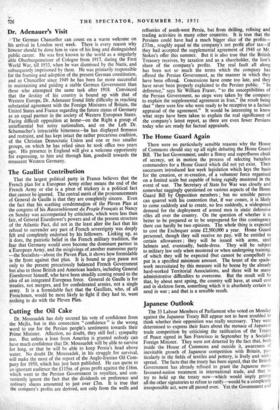The Gaullist Contribution
That the largest political party in France believes that the French plan for a European Army either means the end of the French Army or else is a piece of trickery is a political fact that cannot be ignored. The central merit of the pronouncements of General de Gaulle is that they are completely sincere. Even the fact that his scathing condemnagon of the Pleven Plan at the congress of his Rassemblement du Peuple Francais at Nancy on Sunday was accompanied by criticisms, which were less than fair, of General Eisenhower's powers and of the present structure of the Atlantic Pact, did not in the least alter the fact that his refusal to surrender any part of French sovereignty was deeply felt and completely endorsed by his followers. Linking up, as it does, the patriotic belief in the French military tradition, the fear that Germany would soon become the dominant partner in a'European Army, and the misgivings of another numerous party —the Socialists—about the Pleven Plan, it shows how formidable is the front against that plan. It is bound. to give pause not Only to the present precariously balanced French Government but also to those British and American leaders, including General Eisenhower himself, who have been steadily coming round to the idea of an integrated European force. General de Gaulle is for treaties, not mergers, and for confederated armies, not a single army. It is a formidable fact that the Gaullists, who, of all Frenchmen, would be most likely to fight if they had to, want nothing to do with the Pleven Plan.


































 Previous page
Previous page